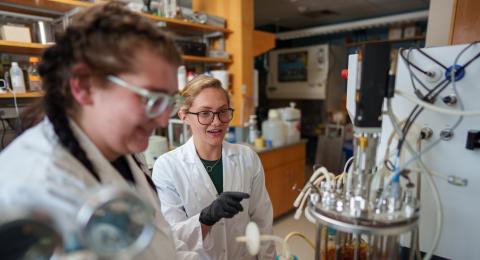Why get a master’s degree in bioengineering?
An M.S. in bioengineering can help you unlock your career potential or enter the world of entrepreneurship. In fact, this advanced degree can translate into more than $15,000 annually in salary compared to those with an undergraduate degree alone. Our program will introduce you to the exciting world of bioengineering research, teaching you how to plan and execute research activities and interpret results. You’ll complete a research thesis in an area such as biophysics, biomaterials, tissue engineering, chemical and biosensors, electrochemical energy storage, or synthetic biology. You’ll be prepared to enter the workforce with a deeper understanding of the fundamentals of bioengineering.
Why choose UNH’s bioengineering program?
Our bioengineering program is leading the way thanks to state-of-the-art facilities, award-winning faculty members and cutting-edge research. Our professors have won National Science Foundation CAREER awards and NIH MIRA Outstanding Investigator grants. They are working to save lives and improve our quality of life through initiatives such as CIBBR (Center for Integrated Bioengineering and Biomedical Research), NH BioMade, the ARMI (Advanced Regenerative Manufacturing Institute), and BIO-SENS (Biologically-Inspired On-demand Strategies for Engineering Nanostructured Sensors). The department hosts a robust seminar series schedule to provide additional opportunities to learn and network within the field.
Potential Career Areas
- Biotechnology
- Medical Devices
- Biomedical Engineering
- Genetic Engineering
- Biomaterials Engineering
- Bioinstrumentation
- Regenerative Medicine
- Pharmaceuticals and medicine
- Synthetic biology
- Tissue engineering
Curriculum & Requirements
An M.S. in Bioengineering can help you unlock your career potential and can translate into more than $15,000 annually in salary compared to those with an undergraduate degree alone. Our program offers a flexible pathway to integrate the life sciences, physical sciences, mathematics and engineering principles to solve problems at the interface of biology, medicine, and engineering. You will complete a research thesis in an area such as biomaterials, tissue engineering, biophysics, synthetic biology, and sensors. You will be prepared to enter the workforce with a deeper understanding of the fundamentals of bioengineering.
Admission Requirements
An applicant to the Master of Science program will have completed a baccalaureate degree in engineering or a related field. Students with good undergraduate records in the science fields may be admitted provided they learn specific math and engineering skills that are aimed at successful completion of the Master of Science program requirements. Applicants must submit current scores (within five years) from the general test of the Graduate Record Examination. International students are required to submit TOEFL test scores. IELTS scores are accepted on a case-by-case basis, and students must have a minimum score of 6.5.
Degree Requirements
A minimum of 30 credits are required as follows:
| Code | Title | Credits |
|---|---|---|
| Required Courses | ||
| CHBE 900 | Seminar 1 | 2 |
| CHBE 860 | Principles of Bioengineering | 3 |
| Select two additional CHBE Courses | 6-8 | |
| Electives | ||
| Select one Math/Data Science course 2 | 3-4 | |
| Select one Life Science course 2 | 3-5 | |
| Select additional electives 2,3 | 8-13 | |
- 1
Students should register for CHBE 900 for 2 credits in their first two semesters and CHBE 900 for 0 credits each additional semester until their degree is granted.
- 2
Can be made up of electives offered by the CHBE department, the College of Engineering and Physical Sciences or the College of Life Sciences and Agriculture. In addition, courses taken within the UNH School of Law, College of Liberal Arts, and the Paul College of Business and Economics can apply with approval. Electives must be assessed with a letter grade and cannot be pass/fail. At least one of the electives must be at the 900-level.
- 3
The elective course credits must include CHBE 899 Master’s Thesis of up to 9 credits.
Program Learning Outcomes
- use appropriate bioengineering techniques, tools and methods to solve broadly defined engineering problems.
- critically analyze the literature and determine the state-of-the-art in a given research topic.
- use computational and/or experimental skills to solve an original research problem in the field of bioengineering and critically analyze the results.
- demonstrate oral and written communication skills.
